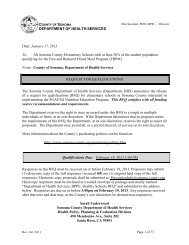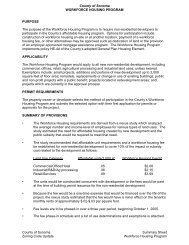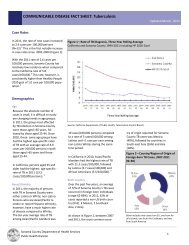Mental Health Board meeting minutes - County of Sonoma
Mental Health Board meeting minutes - County of Sonoma
Mental Health Board meeting minutes - County of Sonoma
You also want an ePaper? Increase the reach of your titles
YUMPU automatically turns print PDFs into web optimized ePapers that Google loves.
<strong>Sonoma</strong> <strong>County</strong><br />
<strong>Mental</strong> <strong>Health</strong> <strong>Board</strong> Minutes<br />
May 15, 2012<br />
Norton Center West Wing Conference Room, Santa Rosa<br />
www.sonoma-county.org/mhboard<br />
(Minutes are posted in draft form and after approval)<br />
Email: dhs-mhb@sonoma-county.org<br />
Please Note: A list <strong>of</strong> commonly used abbreviations and acronyms is attached<br />
CALL TO ORDER<br />
Meeting called to order at 5:00 PM by Sherry Weyers for Doug Stephens, Chair<br />
ROLL CALL<br />
Present: Sharon Hardcastle, Ron Miller, Kathy Smith, Mary Ann Swanson, Sherry Weyers<br />
Absent: Lyndal-Marie Armstrong, Maureen Casey, Mali Lopez, Doug Stephens, Karen Theobald, Rochelle Torre<br />
Public: Megan Rooney and Sheridith Maresh (CFSA), Grace Harris (CPI), Laurie Petta (Goodwill), David France<br />
(NAMI), Christa Seghezzi, Katrin Ciaffa (Buckelew), Carol Rankin, Sally Steinhart (Community Members),<br />
Justin Hester (Tsunami)<br />
<strong>Board</strong> <strong>of</strong> Supervisors Liaison to the MHB: Mike McGuire (absent)<br />
<strong>Sonoma</strong> <strong>County</strong> <strong>Mental</strong> <strong>Health</strong>: Mike Kennedy, BH Director; Michael Lucid, ASO II; Denise Hunt and John Kolhoven,<br />
Section Managers; Marty Marcus, Quality Improvement; Hank Hallowell, Patient Rights Advocate and Liaison to the<br />
MHB; Virginia Meyer, Clerk to the MHB<br />
ANNOUNCEMENTS /PUBLIC INTRODUCTIONS & COMMENTS<br />
1) REMINDER: The June 19 th <strong>meeting</strong> will be a Public Hearing on the MHSA Update, to be held at the Finley<br />
Center in Santa Rosa at 5:00 PM.<br />
2) Currently there are vacancies in Districts 2 (Petaluma), 3 (Santa Rosa), and 4 (North <strong>County</strong>). If you live in one <strong>of</strong> the<br />
districts with openings and are interested in serving on the <strong>Board</strong>, please contact Hank Hallowell, (565-4978 or<br />
Hank.Hallowell@sonoma-county.org ). These contacts are also listed in the <strong>minutes</strong> in the packets available at the<br />
back <strong>of</strong> the room.<br />
3) You may submit agenda items for consideration prior to the Executive <strong>Board</strong> <strong>meeting</strong>, normally held on the first<br />
Wednesday <strong>of</strong> each month, 10:30 to Noon. Email or call MHB clerk Virginia Meyer (565-4850),<br />
Virginia.Meyer@sonoma-county.org to verify the next <strong>meeting</strong> date.<br />
APPROVAL OF MINUTES<br />
The Minutes <strong>of</strong> April 17 th could not be approved in the absence <strong>of</strong> a quorum.<br />
SPECIAL PRESENTATION – Tsunami Enterprises - Justin Hester, Representative Payee Agent<br />
[ info@tsunami-enterprises.org]<br />
Michael Lucid set the context before introducing Justin Hester. He said the <strong>County</strong> used to provide payee services but it<br />
was difficult, so they searched for a company to take over those. The relationship is between the client and Tsunami, and<br />
not really with Behavioral <strong>Health</strong>. A small number <strong>of</strong> clients have so little income that the $38 monthly fee would<br />
seriously deplete their funds needed for basic expenses. In those cases, BH pays the monthly fees.<br />
Justin said Tsunami Enterprises is recognized by the Social Security Administration (SSA) and the Veterans<br />
Administration (VA) as an Organizational Payee. Using the client’s monthly allotment, Tsunami typically pays their rent,<br />
food, and pharmacy bills. Also, many clients have old debts that pre-date their use <strong>of</strong> a payee service, so Tsunami<br />
sometimes must negotiate with the debt holder. They might request a waiver for SSI recipients, but they must try to<br />
negotiate small monthly payments for SSDI recipients.<br />
Contact with clients is done by whatever method fits the client’s needs: telephone, email, or face-to-face at sites such as<br />
Interlink or COTS.<br />
1
Some clients can manage their food budget, but not rent and utilities. Tsunami staff are open to different approaches for<br />
different clients. The VA themselves, without outside information (doctors, courts, etc), determine if the veteran needs<br />
assistance. The VA also sets the budget, not the assigned fiduciary, and it requires a separate bank account. The VA does<br />
not allow the use <strong>of</strong> a collective trust account. Their system is very different from the Social Security system. With SSA,<br />
justification is needed for requesting assistance, and once the need is clear, the client does not have a choice whether or<br />
not to have a payee. With VA, justification is also needed for requesting assistance, and once that need is clear, consumers<br />
can choose a family member or an agency. BH recommends Tsunami to their clients who prefer an agency. Once SSA<br />
decides a payee is needed, they can recommend the payee; others who can recommend a payee are doctors, the courts,<br />
caseworkers, or organizations that work with people who have a disability income and have difficulty managing rent and<br />
utility bills, such as Buckelew or COTS. SSA authorizes Tsunami to collect $38/month or 10% <strong>of</strong> benefits, whichever is<br />
less.<br />
About 490 <strong>Sonoma</strong> <strong>County</strong> residents are Tsunami clients; 290 are open to Behavioral <strong>Health</strong>.<br />
Besides a family or an agency, the payee can be a neighbor or any non-felon; payees don’t even have to live in the same<br />
state, although that situation can complicate things.<br />
Tsunami’s contract with BH is only for clients who otherwise couldn’t pay the fee, and that totals 20-30 individuals.<br />
Most clients are SSI, with an average income <strong>of</strong> about $854/month. If the client receives food stamps, the check is about<br />
$200 less. Some clients get SDI along with SSI and receive $874/month. A few SDI-only clients receive $1500-<br />
$1700/month, but most receive $1,000/month and free MediCal with no share <strong>of</strong> cost. If they receive over $1,180/month<br />
there’s no free MediCal.<br />
Tsunami has a staff <strong>of</strong> five, and as representative payees have no power <strong>of</strong> attorney to sign documents on behalf <strong>of</strong> clients.<br />
They can, however, fill out MediCal forms for signature by the conservator or the client.<br />
A question was asked about communication with family members, and Justin said they ask for it up front, but some clients<br />
are not willing. In general, Tsunami must have written consent to speak to family, and can disclose no details.<br />
Another question asked what happens if a person has knowledge <strong>of</strong> SSI funds being used inappropriately, as in the<br />
example <strong>of</strong> a liquor store holding the funds and giving alcohol to the client. Justin said Social Security doesn’t police the<br />
use <strong>of</strong> funds, but if pro<strong>of</strong> is submitted, the client’s benefits will be suspended and the abuser won’t be prosecuted.<br />
Social Security checks are auto-deposited to Tsunami’s big trust account, and they write paper checks to the client for<br />
tracking purposes. Social Security audits biannually, and Behavioral <strong>Health</strong> has access to Tsunami’s database.<br />
Justin recommends that clients have savings accounts, because debit cards are not issued with those, creating fewer<br />
opportunities for anyone to take advantage <strong>of</strong> clients.<br />
Tsunami manages only Social Security and Veterans Administration funds, because as a non-pr<strong>of</strong>it, they can’t contract<br />
with others for financial management.<br />
A client gets <strong>of</strong>f representative services through the reverse <strong>of</strong> the process. Doctors, the caseworker, etc. can make the<br />
recommendation, and if he knows about the recommendation ahead <strong>of</strong> time, Justin tries to transition the clients to paying<br />
their bills on time. Some end up back with Tsunami three months later because being responsible for paying bills is more<br />
stress than they can handle. Hank Hallowell said a Client Plan Goal is now ”To get <strong>of</strong>f Rep Payee.”<br />
A member asked if the family is contacted when there is “too much” money in the account to comply with SSI<br />
requirements. Justin said they try to do that but don’t always have family contact info. She said it would be nice to get<br />
acknowledgment from the rep payee that the family is working to help clients.<br />
Another member asked if, at the initial <strong>meeting</strong>, the client be <strong>of</strong>fered a consent for allowing Tsunami to talk to creditors<br />
and utilities. Justin said they do have the power to make sure utilities are not turned <strong>of</strong>f.<br />
Tsunami serves about 1,300 clients in Mendocino, Lake, <strong>Sonoma</strong>, Napa, and most recently, Solano counties. The name<br />
Tsunami was chosen as it was the name <strong>of</strong> a previous business run by the founder, and because life can be overwhelming.<br />
They try to help.<br />
ACTION ITEM None tonight<br />
BOARD PLANNING Sherry reminded members that a nominating committee is needed, and that will be a June<br />
Executive Committee agenda item.<br />
2
REPORT OF BEHAVIORAL HEALTH DIVISION DIRECTOR Mike Kennedy, MFT<br />
Mike said the Governor’s May Budget Revise came out yesterday and is still being analyzed. <strong>Health</strong> and Human Services<br />
as well as Education are still at risk. If the Governor’s tax increases are not passed, pre-set “triggers” will cause more cuts.<br />
There are many changes at the State Level. DMH duties are going to the Department <strong>of</strong> <strong>Health</strong> Care Services (DHCS),<br />
and the State Department <strong>of</strong> Alcohol and Drug Programs is probably going away. There are lots <strong>of</strong> discussions around<br />
who will assume oversight.<br />
In fiscal year 2012/2013 we’re trying to keep things flat, with no reductions. We’re all right for the moment, and will<br />
continue tracking issues at the State level as we do every year, and try to stay ready in case more cuts are coming.<br />
We just finished the 10 th Crisis Intervention Training (CIT) Academy, for a total <strong>of</strong> 300 law enforcement deputies and<br />
<strong>of</strong>ficers who have learned to intervene effectively with someone in the middle <strong>of</strong> a mental health crisis. The Sheriff has<br />
138 trained deputies out <strong>of</strong> approximately 150 on the street. Santa Rosa Police Department has 90 <strong>of</strong> about 120 now<br />
trained in CIT techniques.<br />
CIT is a 32-hour, four-day training that features lectures from experts, tours <strong>of</strong> behavioral health programs, various roleplaying<br />
vignettes with hands-on practice, a Returning Vets panel, a panel <strong>of</strong> Consumers, a panel <strong>of</strong> Family Members, and<br />
more. An entire day is spent on mental health diagnoses. Sending <strong>of</strong>ficers is a huge commitment for agencies, because the<br />
attending <strong>of</strong>ficers’ shifts must be covered. Even so, Mike said some <strong>of</strong> the smaller jurisdictions have managed to send<br />
<strong>of</strong>ficers over the past five years, including Sebastopol (12), Rohnert Park (8), SRJC (6), Petaluma, and even 2 from the<br />
CHP. Reportedly, CIT-trained <strong>of</strong>ficers are able to talk more about symptoms, know when medical clearance is needed,<br />
have better-written 5150s, and know when to divert appropriately rather than jailing clients. Mike said PES has noted a<br />
difference in how these <strong>of</strong>ficers treat people.<br />
The comprehensive curriculum has been developed over time and is the most intensive training they can get. Mike said he<br />
can see the change in people over the course <strong>of</strong> the week as they begin to embrace the techniques. A MHB member who<br />
served on the Family Panel said, “We touch them on a pr<strong>of</strong>essional and personal levels,” and they talk to her about their<br />
family members.<br />
Mike said the relationships we’ve built with all these agencies are helping the way our clients are treated by law<br />
enforcement out in the community.<br />
Sheridith Maresh, manager <strong>of</strong> the Empowerment Center in Guerneville, read a letter from a Sheriff’s deputy about a<br />
recent incident there:<br />
"Thank you for your opinion on how we addressed the [member] incident. The Sheriff's <strong>of</strong>fice really wants to<br />
serve the community adequately and has emphasized compassion in dealing with subjects in emotional crisis.<br />
Your opinion <strong>of</strong> our involvement with [the member] is heavily weighed, considering your position.<br />
Coincidentally, I saw her walking near Safeway several days later and stopped to say ‘hello’. She was very<br />
polite and appreciative to me for treating her ‘respectfully’. After briefly talking with her, I felt like I had<br />
‘helped’ her. As I drove away, I smiled and felt good about my ability to be there. I felt like I actually made a<br />
difference. That is very rewarding!"<br />
An audience member asked if the <strong>Board</strong> <strong>of</strong> Supervisors has designated any facilities under the Lanterman-Petris-Short Act<br />
[ http://www.leginfo.ca.gov/cgi-bin/displaycode?section=wic&group=04001-05000&file=5000-5120 ], and Mike replied that PES is so<br />
designated.<br />
Mike said we’re hiring to fill thirty vacancies. A lot <strong>of</strong> students are graduating from SSU, and we’re getting more<br />
bilingual/bicultural staff. We supported the Student <strong>Mental</strong> <strong>Health</strong> Initiative<br />
[www.dmh.ca.gov/.../Student<strong>Mental</strong><strong>Health</strong>Initiative.asp] and have made a proposal with SSU and SRJC for student peer<br />
counselors. SSU has a project focused on returning vets.<br />
MH SYSTEMS TRANSFORMATION Section Managers<br />
<strong>Sonoma</strong> <strong>County</strong>’s <strong>Mental</strong> <strong>Health</strong> Services Act [MHSA] page is at www.sonoma-county.org/mhsa<br />
The State’s MHSA page is at http://www.dmh.ca.gov/Prop_63/MHSA/default.asp<br />
Denise Hunt, RN, MSN, Acute/Forensics Section Manager - PES is <strong>of</strong>fering smoking cessation options to clients, a major<br />
initiative in partnership with the Department <strong>of</strong> <strong>Health</strong> Services.<br />
3
The FACT program started a Client Council four years ago, and they recently decided to build a raised bed garden outside<br />
the <strong>of</strong>fices at 2350 Pr<strong>of</strong>essional Drive. Please feel free to drive by to see it. The clients work it and we supply the<br />
materials. Clients also chose the plants and will have communal meals with the produce. We see this as a way <strong>of</strong> teaching<br />
healthy eating habits.<br />
The Older Adult Team participated in stateside trainings on Best Practices.<br />
Starting Point sent four staff to Cognitive Behavioral Therapy training for in-custody <strong>of</strong>fenders, under the AB109 mandate<br />
to keep low-level <strong>of</strong>fenders in their communities and give them treatment them rather than sending them to prison.<br />
The Mobile Support Team has identified liaisons to law enforcement and DAAC, has a manager identified, and will be<br />
hiring the team. Team members will be licensed and some will be bilingual. When they go out on a crisis call, a team<br />
member will stay behind with the family to explain the process and <strong>of</strong>fer support and resources. A board member said that<br />
the follow-up piece is the part she’s especially excited about. This program will start small and in a limited area at first,<br />
and it will involve the police chaplaincy program.<br />
John Kolhoven PhD, Adult Services, CAPE Team, and Youth & Family Section Manager - John said it’s exciting that we<br />
have 33 new staff - including many interns - beginning a five-week orientation process.<br />
On the children’s side, Human Services and Probation are working in collaboration with Youth Services. As <strong>of</strong> May 1 st ,<br />
Jennifer Morehouse MFT has been embedded full time in Human Services to screen kids 5-18 years. In the first week she<br />
identified seven kids and referred them to services. These are kids that we ordinarily would never see. CPI is also working<br />
with that population.<br />
We’re coming to the end <strong>of</strong> the MOU (Memorandum <strong>of</strong> Understanding) with SELPA. We have benefitted by having a<br />
good relationship with them and are open to continuing to work with them.<br />
A member <strong>of</strong> the audience praised his positive experience with the CAPE Team. He said he was impressed with the<br />
quickness <strong>of</strong> their response. They were at the school in ten <strong>minutes</strong>, and the student was taken to PES for help.<br />
REPORT FROM THE CHAIR<br />
None tonight, but Sherry thanked all those in the community who work with Behavioral <strong>Health</strong>.<br />
OTHER REPORTS<br />
Sherry will be forwarding an email from CALMHB regarding a <strong>meeting</strong> and three webinars that members might find<br />
interesting.<br />
She said CBS 5 news last night featured Santa Clara’s Judge Stephen Manley, a speaker at NAMI conventions, who<br />
talked about veterans in his courtroom and how he works with them. His is the first Veterans <strong>Mental</strong> <strong>Health</strong> Court in the<br />
nation, and soon there will be a second one in San Mateo.<br />
BOARD DISCUSSION / PUBLIC COMMENTS<br />
None tonight.<br />
Meeting adjourned at 6:57 PM<br />
Respectfully submitted,<br />
Virginia Meyer, <strong>Mental</strong> <strong>Health</strong> <strong>Board</strong> Clerk<br />
Virginia.Meyer@sonoma-county.org<br />
4
ABBREVIATIONS & ACRONYMS<br />
5150<br />
Declared to be a danger to self and/or others<br />
AB3632 Assembly Bill - State-mandated MH services for seriously emotionally disturbed youth<br />
ACT Assertive Community Treatment (run by Telecare)<br />
ANSA Adult Needs and Strengths Assessment – a “tool” for determining which services are needed by each particular adult client<br />
AODS Alcohol and Other Drugs Services – now a part <strong>of</strong> the <strong>Mental</strong> <strong>Health</strong> Division<br />
CANS Child, Adolescent Needs and Strengths (Assessment) – helps determine which services are needed by each child client<br />
CAPE Crisis Assessment, Prevention, and Education Team; goes into the schools when called to intervene<br />
CHD California Human Development<br />
CIP Community Intervention Program<br />
CIT Crisis Intervention Training (for law enforcement)<br />
CMHC Community <strong>Mental</strong> <strong>Health</strong> Centers (SCMH))<br />
ConREP Conditional Release Program (State-funded)<br />
CR Crisis Residential (aka Progress <strong>Sonoma</strong>-temporary home for clients in crisis, run by Progress Foundation )<br />
CS Crisis Stabilization – within PES - see PES (up to 23 hours)<br />
CSN Community Support Network (contract Provider)<br />
CSS Community Services and Support (part <strong>of</strong> <strong>Mental</strong> <strong>Health</strong> Services Act-MHSA)<br />
DAAC Drug Abuse Alternatives Center<br />
DHCS (State) Department <strong>of</strong> <strong>Health</strong> Care Services (replacing DMH July 1, 2011)<br />
DHS Department <strong>of</strong> <strong>Health</strong> Services (<strong>Sonoma</strong> <strong>County</strong>)<br />
DMH State Department <strong>of</strong> <strong>Mental</strong> <strong>Health</strong> in Sacramento – being disbanded in FY11/12<br />
EPSDT Early Periodic Screening, Diagnosis & Treatment (Children’s MediCal)<br />
FACT Forensic Assertive Community Treatment<br />
FASST Family Advocacy Stabilization, Support, and Treatment (kids 8-12)<br />
FQHC Federally Qualified <strong>Health</strong> Center<br />
HSD Human Services Department<br />
IHT Integrated <strong>Health</strong> Team (medical and MH services for adults)<br />
IPU Inpatient Psychiatric Unit<br />
IRT Integrated Recovery Team (for those with mental illness + substance use issues)<br />
IMDs Institutes for <strong>Mental</strong> Disease (residential facilities for those unable to live on their own)<br />
INN Innovation (part <strong>of</strong> MHSA)<br />
LG Los Guilucos-Juvenile Hall<br />
LGBQQTI Lesbian/Gay/Bisexual/Queer/Questioning/Transgender/Intersexed (also LGBT)<br />
MADF Main Adult Detention Facility (Jail)<br />
MHB <strong>Mental</strong> <strong>Health</strong> <strong>Board</strong><br />
MHD <strong>Mental</strong> <strong>Health</strong> Division (<strong>Sonoma</strong> <strong>County</strong>)<br />
MHSA <strong>Mental</strong> <strong>Health</strong> Services Act<br />
MST Mobile Support Team<br />
NAMI National Alliance on <strong>Mental</strong> Illness<br />
NBSP North Bay Suicide Prevention Project<br />
PC1370 Penal Code 1370 (Incompetent to Stand Trial, by virtue <strong>of</strong> mental illness)<br />
PES Psychiatric Emergency Services – open 24/7 for psychiatric crises - 3322 Chanate Road<br />
PEI Prevention and Early Intervention (part <strong>of</strong> <strong>Mental</strong> <strong>Health</strong> Services Act-MHSA)<br />
PPSC Petaluma People Services Center<br />
QI Quality Improvement - Marty Marcus and Wendy Sanders<br />
QIP Quality Improvement Policy (<strong>meeting</strong>)<br />
QIS Quality Improvement Steering (<strong>meeting</strong>)<br />
QIC Quality Improvement Committee (<strong>meeting</strong>)<br />
RCC Redwood Children’s Center<br />
RCL Rate Classification Level (12, 13, 14 - group home designations)<br />
RFP Request For Proposals (released when new programs are planned and contractors are solicited)<br />
SCMH <strong>Sonoma</strong> <strong>County</strong> <strong>Mental</strong> <strong>Health</strong><br />
SCOE <strong>Sonoma</strong> <strong>County</strong> Office <strong>of</strong> Education<br />
SELPA Special Education Local Plan Area<br />
SPMI Serious Persistent <strong>Mental</strong> Illness (or Seriously Persistently <strong>Mental</strong>ly Ill)<br />
SYC Sierra Youth Center<br />
TAY Transition Age Youth (18-25)<br />
VOMCH Valley <strong>of</strong> the Moon Children’s Home<br />
WET Workforce Education and Training (part <strong>of</strong> MHSA)<br />
WRAP Working to Recognize Alternative Possibilities<br />
WRAPAROUND Community-based intervention services that emphasize the strengths <strong>of</strong> the child and family<br />
YS/Y&F Youth Services/Youth & Family (<strong>Sonoma</strong> <strong>County</strong> <strong>Mental</strong> <strong>Health</strong>)<br />
5

















